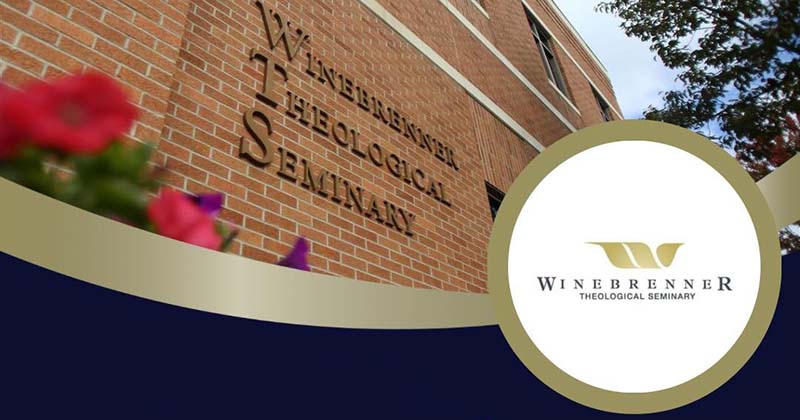
5 minute read
A History of Collaboration, Stewardship & Discipleship
by Jacob ClaggCGGC Director of Communications
Collaboration, Stewardship, and Discipleship are the pillars of WTS’s current strategic priorities. And yet, if we look back 80 years to Winebrenner’s founding, we can clearly see, almost prophetically, how these same pillars were in place in 1942.
Winebrenner Graduate School of Divinity, as it was called in 1942, began as a collaborative effort between Findlay College and College First Church of God. The Church provided the physical location, with classes taking place in the church, while the Church and the CGGC supported the college’s annual budget. Of course, a large portion of the students came directly from the CGGC as well. And all of this was in service to the idea of seeing Christians educated well and raised up to positions of leadership.
But that didn’t mean the task of educating and discipling these students was easy. The existence of Winebrenner as a Graduate School of Findlay was an immediate challenge to the accreditation of the College. It brought new, higher standards with regard to funds spent on students, facilities, faculty pay, and more. It was, at the time, insurmountable given Findlay College’s resources. They had too few supporters, too few students, too few books in their library, too little housing, and more. Between 1942 and 1947, the North Central accrediting body had given Findlay a number of warnings about revoking accreditation. In 1948, there were no more warnings. The loss of this accreditation was an immense challenge, but not an impossible one.
The College, the denomination, and many local churches gathered together to see the program supported and to ultimately thrive. It wouldn’t be until 1960 that the Seminary would officially separate and become its own body distinct from the College, allowing Findlay the ability to regain its accreditation with North Central.
On its own, Winebrenner Seminary would continue to find more challenges. Challenges that Winebrenner had at Findlay followed them when they became a new institution. The need for additional library books and services, student support, additional faculty, living space, and more once again became pressing needs. By 1969, financial concerns were so bleak that an initial decision was made to shutter the school. Once again, proper stewardship and collaboration kept Winebrenner afloat. In a special October meeting of that year, the denomination rallied to save the school and meet its needs.
It's apparent that proper stewardship and student accessibility were present even in WTS’s earliest days. Government assistance, thanks to educational support made possible during Truman’s Fair Deal era of the late 40s, early Winebrenner students were only charged a fee of $30 per student, and approximately $10.50 per week for room and board. Crucially, this made getting a quality education highly accessible, especially for students who were mostly rural.
We see the same ethos of stewardship today, ensuring the seminary is run with student economics in mind. WTS is on the forefront of affordable graduate education, charging only $300 a month for tuition, which allows students to take any number of classes they are qualified for, whether it’s for the divinity or the counseling programs.
Student accessibility has increased in other ways too. While in the early days Winebrenner Seminary was constantly concerned about proper student housing and providing sufficient services to meet student and accreditation requirements, now WTS’s online platform allows students with a wide variety of education needs to be met. Students can attend Winebrenner where they are, from around the country, without the complicated and prohibitively expensive move, either lodging in campus dorms or selling their home and finding a new one in the Findlay area.
Discipleship is, perhaps, the most obvious of all strategic priorities for a seminary. And we need to look no further than the students themselves. Alumni of all kinds can confirm that the seminary has played a crucial part in their discipleship journey.
Pastor Paul Rutledge, a 1997 Winebrenner Alumni, of Risingsun First Church of God, Ohio, said that, “The institution has helped me have the foundation I needed to be an effective pastor. I've used every class I took at Winebrenner in some capacity in 28 years of ministry.” But it didn’t stop at just education. “Winebrenner reached out over the years to pray for me and to see how I was doing. I'm blessed that I received my degree from Winebrenner,” Pastor Paul concluded.
From providing quality biblical education and preparing students to minister and preach the gospel, to mentoring and preparing them for the practical side of ministry and Christian counseling, Winebrenner Seminary has set a firm foundation for alumni to both launch and go deeper in their faith.
Furthermore, the cooperation from UF and the denomination to see Winebrenner thrive has paid dividends back. Winebrenner grads have lead the denomination, both nationally and regionally time and again, demonstrating that Winebrenner Alumni have been discipled well to lead.
Dr. Gale Ritz, first president of the seminary, said the following during an Inaugural prayer in 1963.
“We recognize in Thee, O Lord, the foundation of all knowledge and truth, and we pray that Thou would grant this day Thy richest blessing upon our Winebrenner Theological Seminary, upon its faculty and student body.
“We give Thee thanks, O God, for the wisdom of those who envisioned the need of a seminary; for the perseverance of those who kept alive the dream that this has led to the reality of the present campus and its fine facilities; and for the faithful stewards of this church and every church who have shared of their means to underwrite the costs of so noble an adventure.”
Amen.








